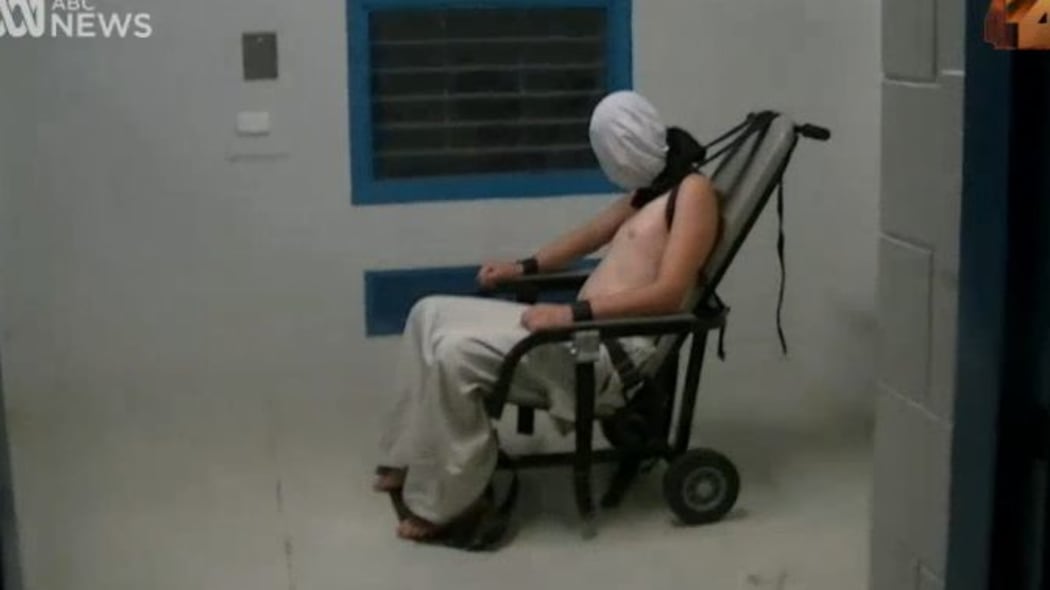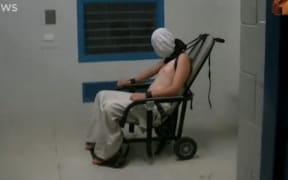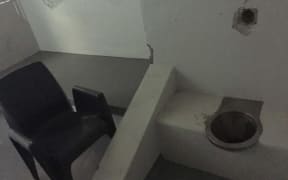A young Australian inmate has told an inquiry into Northern Territory's youth detention system that he was starved by guards, repeatedly strip-searched and forced to go to the toilet in his pillowcase.

The photo of Dylan Voller that stunned Australia. Photo: ABC
Dylan Voller, 19, is an inmate at Darwin's adult prison and a key witness the royal commission into youth detention and child protection.
Images of Voller hooded and shackled to a chair in an ABC Four Corners programme were beamed into households across Australia and pushed Prime Minister Malcolm Turnbull to call for the investigation.
He said when restrained in the chair he felt completely defenceless.
"I was getting dizzy from panicking, I was getting agitated because the officer holding the camera was sitting there. He'd act nice and then turn the camera off and start trying to agitate me and then turn the camera back on," he said.
"The feeling of not being able to do anything, those officers could have done anything to me for that three-and-a-half hours and I wouldn't have been able to do anything about it.
"Fear of them having control … there was no responsible person who would have said, 'that's enough, we need to get him out of that restraint chair now, he's been in there for too long'."
He said he vomited in his mouth while hooded, and that he wet himself while restrained in the chair.
He said when he and five other detainees were gassed, he "felt like I was going to die".
Voller read out a personal statement to the commission, saying the justice system as a whole was the problem.
He said judges sentenced people to serve jail time, and that they were additionally punished by abusive staff.
"Young people need love and someone to talk to, not to be locked in a cell with nothing to do for days on end."
Voller said his schooling ended when he was about 10. He had ADHD but was not permitted to attend school unless he took medication, which, he said, made him physically ill.
He was sent into care in Alice Springs, where he said older boys introduced him to smoking marijuana and encouraged him to commit crimes with them.
'He didn't agree with them starving me'
Voller described several incidents in youth detention in Alice Springs and Darwin when he was denied food and water by the guards.
He said once in the Behaviour Management Unit at Don Dale, a youth justice officer came in to offer the inmates water.
"Because that officer didn't really like me, he asked me, 'do you want water, Voller?' and I said 'yes', and as he was walking out he threw it on the ground and said 'there you go,' and walked off."
He also described a period of regular strip-searches, including after every family visit, court trip, or trip to the toilet.
Voller said that while in youth detention in Alice Springs he was forced to defecate into a pillowcase.
"I'd been asking to go to the toilet for four or five hours and they kept saying no, and I ended up having to defecate into a pillowcase because they wouldn't let me go to the toilet," Voller said.
He said other detainees also had to urinate into water bottles and then throw them out the next day when staff wouldn't let them out of their cells to go to the toilet.
He tried to choke himself with his seatbelt in order to prevent being transferred so far away from his family, he said, and during the trip he threw up because the guards smoked heavily the whole way.
Voller also said that while in detention guards would often strip inmates and empty their cells as punishment for things such as ringing the intercom.
"There was a time they left me in there with no clothes, no sheets, no mattress, no nothing all night, and they turned the air-con on full blast. I was crying, asking for a blanket," Voller said.
"It was a punishment for them to take our mattress or our clothes, if we blocked our camera… if you got kicked out of school they'd take it out so you didn't get to lay down and be comfortable.
But Voller told the commission that during his time in youth detention there were three officers that took an interest in the inmates and tried to talk to them and their families, but he didn't want to name them in case they were subject to retribution.
"Most of them didn't make an effort to make sure family relationships were strong… they just came to work to get paid and go home, they didn't care about what was happening with the young people in there," Voller said.
- ABC




